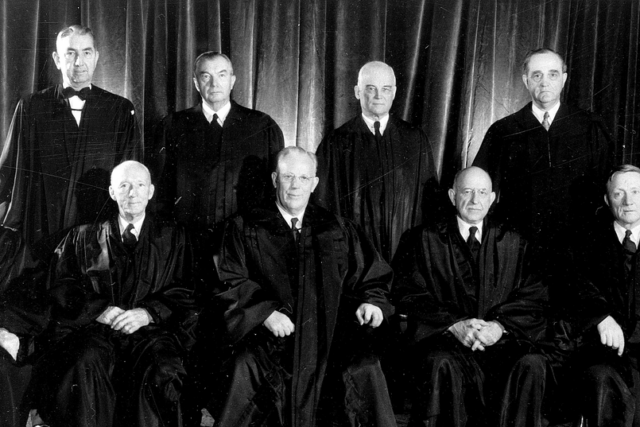Justice for Sale: A Shopping List
How much does it cost to buy your own state supreme court justice?
Tyler Price
February 11, 2023
State Supreme Courts
State supreme courts are the ultimate arbiters of law within a U.S. state. Yet, these state supreme courts often live in the shadow of their federal counterpart. Federal Supreme Court decisions make headlines, while state supreme court decisions fly under the radar. All while state supreme court rulings continue to have an enormous impact on the lives of their state’s residents.
95% of all cases in the country are filed in state courts, totaling more than 70 million cases. Americans are far more likely to end up in state court, and therefore are more likely to be at the whim of the state supreme court, as opposed to a federal court. Every year, state supreme courts have the final word on incredibly important issues, ranging from voting rights to the funding of state educational institutions. State supreme courts have taken steps the federal Supreme Court has shrunken away from, and have protected rights the Supreme Court refuses to recognize nationwide. It was the Washington state Supreme Court that unanimously struck down the state’s death penalty law, stating that it was imposed “in an arbitrary and racial biased manner.” It was West Virginia’s Supreme Court that decided the right to education is a fundamental right inherently owed to its state’s residents. And it was the Massachusetts Supreme Court that recognized a right to abortion under the state’s constitution. The lives of Americans are impacted everyday by their state’s supreme courts decisions.
The power state supreme courts have is derived from their ability to interpret both state law and their state’s constitution. We are all no doubt familiar with the federal Constitution, which guarantees rights such as the freedom of speech and freedom of expression. However, each state has its own constitution that binds its state government. While state constitutions cannot protect fewer rights than the federal Constitution, there is nothing stopping them from being more protective. This is why, for example, several state constitutions have been interpreted to provide a right to education while the federal Constitution has not. Thus, state supreme courts have the ability to interpret their state constitutions to confer more protections than the federal constitution, which are then passed down specifically to residents within the state.
That means civil rights advocates can often find more rights in state constitutions than in the federal Constitution, and those litigants have begun to flood flood state courts in recent years as the federal judiciary has become more conservative. Over the past two decades, the make up of the federal judiciary has shifted dramatically. Beginning during President Barack Obama’s administration, Congress began blocking dozens of Obama’s federal judicial nominees. By the end of Obama’s second term, those blockings led to over 140 seats on federal benches across the country being empty.
After President Donald Trump took office, those seats were filled at a rapid pace. Judges were no longer blocked, and, as described by Theresa Lee, the Litigation Director of Harvard Law School’s Election Law Clinic, “if a judge was put up for appointment, the [Mitch] McConnell senate majority pushed them through.” As Lee states, this entrechment led to a “skewed federal bench” that “[did] not track with the actual democratic choices for President.” In light of that shift, civil rights advocates were forced to begin to “turn to the states” to bring their arguments in court. Thus, state courts have become courts of “only resort” for those pursuing a civil rights agenda.
Thus, state courts have become courts of “only resort” for those pursuing a civil rights agenda.
Moreover, the federal Supreme Court has also determined that several issues should be decided by each state independently, according to the values of their residents. For example, this year the Supreme Court decided that the right to an abortion is not a constitutional right offered by the Federal Constitution, and that therefore individual states have the power to regulate abortion access. In the aftermath of that decision, civil rights organizations such as the American Civil Liberties Union dove into state courts. These advocates argued that, while the federal Constitution may not confer a right to abortion, certain invidual state constitutions did, ensuring the right to abortion in states such as Kentucky and Utah.
Similar arguments have worked in the realm of voting rights. Recently, the Supreme Court ruled that gerrymandering — the act of drawing voting districts in a dishonest manner to favor one party (or disfavor a group of voters) — was not an issue that could be decided by federal courts. Thus, for the past few years, the only place to challenge unfair voting maps was in state courts, where advocates could argue that gerrymandering violates a state’s constitution.
The importance of state supreme court decisions has increased dramatically. And, as these courts’ decisions become more consequential, they have stepped out of the federal Supreme Court’s shadow and into the limelight.








